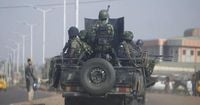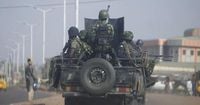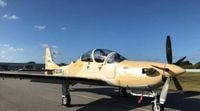The United States has taken a significant step toward boosting Nigeria’s security apparatus, approving a potential $346 million sale of advanced munitions and precision-guided weapons to the West African nation. The move, announced on August 14, 2025, by the U.S. State Department and detailed by the Defense Security Cooperation Agency (DSCA), underscores Washington’s commitment to supporting a strategic partner grappling with persistent threats from terrorist groups and illicit trafficking within its borders and the wider Gulf of Guinea.
This proposed arms package, which still requires congressional approval, is more than just a transaction—it’s a reflection of the evolving security landscape in Nigeria. The country, Africa’s most populous, has been under siege from Boko Haram and other jihadist factions, particularly in the northeast. According to the United Nations, the conflict has led to approximately 35,000 civilian deaths and displaced over 2 million people in the region. In recent months, attacks have surged, with militants overrunning military outposts, laying roadside bombs, and raiding civilian communities. These developments have stoked fears of a return to the dark days of Boko Haram’s peak insurgency, despite Nigerian military claims of progress.
The DSCA, the Pentagon’s division responsible for overseeing foreign military sales and providing technical assistance, emphasized the strategic rationale behind the deal. “This proposed sale will support the foreign policy goals and national security objectives of the United States by improving the security of a strategic partner in sub-Saharan Africa,” the agency stated, according to Cirium. The agency further noted, “The proposed sale will improve Nigeria’s capability to meet current and future threats through operations against terrorist organisations and to counter illicit trafficking in Nigeria and the Gulf of Guinea.”
The weapons package is both comprehensive and technologically advanced. It includes 1,002 MK-82 general-purpose 500-pound (227-kilogram) bombs, 5,000 Advanced Precision Kill Weapon System II all-up-rounds—each featuring a WGU-59/B guidance section, a high-explosive warhead, and an MK66-4 rocket motor. Additionally, the deal covers 1,002 MXU-650 Air Foil Groups for 500-pound Paveway II GBU-12 bombs, 515 MXU-1006 Air Foil Groups for 250-pound (113-kilogram) Paveway II GBU-58 bombs, and 1,517 MAU-169 or MAU-209 computer control groups for Paveway II GBU-12/GBU-58. Rounding out the list are 1,002 FMU-152 joint programmable fuzes, FMU-139 joint programmable fuzes, bomb components, impulse cartridges, and both high-explosive and practice rockets.
It’s not just about the hardware. The deal also includes logistical and program support, ensuring that Nigeria’s armed forces can effectively absorb and deploy these munitions. The Nigerian Air Force, which will be the primary beneficiary, operates a fleet of 12 Embraer EMB-314 Super Tucano light attack aircraft—platforms well-suited to deploy the MK-82 bombs and Paveway II guided munitions. Other fixed-wing assets in Nigeria’s arsenal include three Chengdu/Pakistan Aeronautical Complex JF-17s, 11 Chengdu F-7s, and 12 Dassault/Dornier Alpha Jets, all used in ground-attack roles, along with a contingent of attack helicopters, according to Cirium fleets data.
The contractors tapped to supply these weapons read like a who’s who of the global defense industry: RTX Missiles and Defense (formerly Raytheon Technologies), Lockheed Martin, and BAE Systems. Their involvement brings not only advanced technology but also a track record of supporting allied militaries around the globe.
For Nigeria, the timing of this potential sale couldn’t be more critical. In addition to the long-running insurgency in the northeast, the country faces mounting security challenges in its north-central and northwest regions. There, banditry, communal violence, and criminal gangs have left hundreds dead or injured in recent months, compounding the government’s security woes. The weapons and support from the U.S. are intended to bolster Nigeria’s ability to respond to these multifaceted threats, both from organized terrorist groups and from illicit trafficking operations that undermine regional stability.
The U.S. government has made it clear that its own military readiness will not be compromised by the transfer. “There will be no adverse impact on U.S. defense readiness as a result of this proposed sale,” the Pentagon said, as reported by the Associated Press. This assurance likely aims to allay any domestic concerns about the diversion of critical resources abroad at a time of global uncertainty.
This is not the first time the U.S. has supplied military hardware to Nigeria. In 2022, Washington approved a $997 million weapons sale to the country, reinforcing a pattern of deepening security cooperation. Over the past decade, Nigeria has repeatedly turned to the U.S. for advanced equipment and training, reflecting both the scale of its security challenges and the strategic importance Washington places on stability in West Africa.
Still, the deal is not without its hurdles. Congressional approval is required before any transfer can take place, and lawmakers have, in the past, scrutinized arms sales to countries with complex human rights records or histories of internal conflict. While the U.S. sees Nigeria as a vital partner in the fight against terrorism and trafficking, some legislators and advocacy groups have raised concerns about oversight and the potential for misuse of advanced weaponry.
Despite these concerns, the logic behind the sale is clear. Nigeria’s security is not just a local issue—it has regional and even global implications. The Gulf of Guinea, a key maritime corridor, has seen a rise in piracy and trafficking, threatening international shipping and economic interests. A more capable Nigerian military, equipped with precision munitions and supported by U.S. expertise, is seen as a bulwark against these destabilizing forces.
As the deal moves through the approval process, all eyes will be on Abuja and Washington. For Nigeria, the hope is that this influx of modern weaponry will tip the balance against insurgents and criminals who have, for too long, held sway over large swathes of the country. For the U.S., the sale represents both a strategic investment and a test of its ability to balance security cooperation with broader foreign policy values.
Ultimately, the proposed $346 million weapons sale is a reminder of the enduring—and evolving—partnership between the United States and Nigeria, forged in the crucible of shared security challenges and mutual interests.






